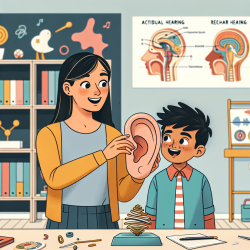The evolution of cochlear implant technology and its application in individuals with severe to profound hearing loss has been a subject of extensive research and discussion within the audiological and speech therapy communities. A pivotal study, "Expanded Indications for Cochlear Implantation: Perceptual Results in Seven Adults with Residual Hearing," provides invaluable insights into the perceptual outcomes of cochlear implantation in adults who, preoperatively, demonstrated marginal benefits from conventional amplification.
This research is particularly relevant for speech therapists working with severely to profoundly hearing-impaired adults, offering a new perspective on the potential for cochlear implants to enhance auditory perception and, consequently, speech recognition and production abilities. Here, we delve into the study's findings and explore how practitioners can implement these outcomes in their therapeutic approaches or be encouraged to conduct further research in this area.
Key Findings:
- The study observed significant improvements in sound detection, phoneme identification, and open-set speech recognition in subjects post-cochlear implantation, both with the implant alone and in combination with a contralateral acoustic hearing aid.
- These improvements suggest the potential for expanding cochlear implantation indications to include individuals with some level of residual hearing, challenging the traditional candidacy criteria.
- Subjects demonstrated not only enhanced speech perception abilities but also reported subjective improvements in their hearing experiences, underscoring the impact of cochlear implantation on quality of life.
Implications for Speech Therapy Practice:
The findings from this study underscore the importance of considering cochlear implantation as a viable option for a broader range of hearing-impaired adults, including those with residual hearing. For speech therapists, this expands the scope of intervention strategies and necessitates an integrated approach to therapy that encompasses both technological and therapeutic advancements.
Implementing Research Outcomes:
- Assessment and Evaluation: Incorporate comprehensive audiological assessments to evaluate the potential benefits of cochlear implantation for individuals with severe to profound hearing loss, considering residual hearing as a critical factor.
- Therapeutic Techniques: Develop specialized aural rehabilitation programs that leverage the enhanced auditory capabilities provided by cochlear implants, focusing on phoneme discrimination, speech tracking, and open-set speech recognition exercises.
- Interdisciplinary Collaboration: Work closely with audiologists, otologists, and cochlear implant teams to ensure a cohesive approach to patient care, from pre-implantation evaluation to post-operative rehabilitation and ongoing therapy.
- Continued Education and Advocacy: Stay informed about the latest research and technological advances in cochlear implantation. Advocate for access to cochlear implantation for eligible individuals, emphasizing the potential for significant improvements in speech perception and communication abilities.
Encouraging Further Research:
This study's results highlight the need for ongoing research to explore the full potential of cochlear implants in individuals with residual hearing. Speech therapists can contribute to this body of knowledge by:
- Participating in clinical trials and research initiatives focused on cochlear implant outcomes.
- Documenting and sharing case studies that illustrate the impact of cochlear implantation on speech and language rehabilitation.
- Exploring the long-term effects of cochlear implantation on speech perception, production, and psychosocial outcomes.
In conclusion, the research presented in "Expanded Indications for Cochlear Implantation: Perceptual Results in Seven Adults with Residual Hearing" offers compelling evidence for the benefits of cochlear implants in a previously underserved population. By integrating these findings into practice, speech therapists can enhance the therapeutic outcomes for adults with severe to profound hearing loss, ultimately improving their communication abilities and quality of life. For those interested in exploring this topic further, I highly recommend reading the original research paper.
To read the original research paper, please follow this link: Expanded Indications for Cochlear Implantation: Perceptual Results in Seven Adults with Residual Hearing.










